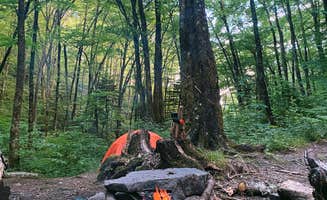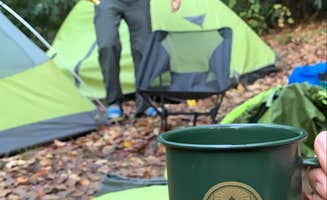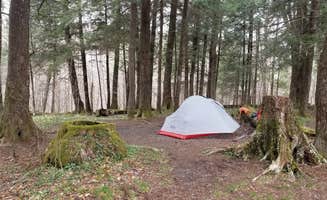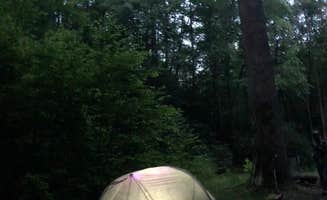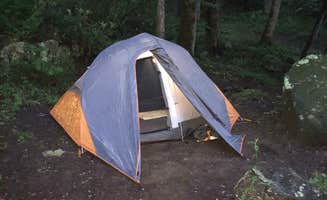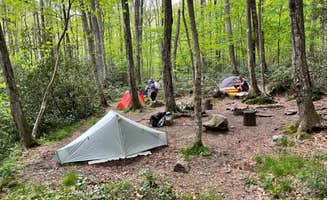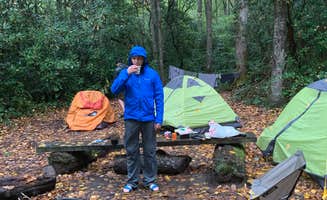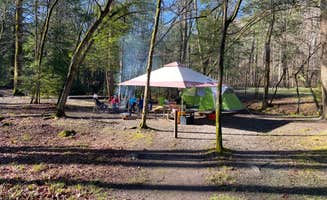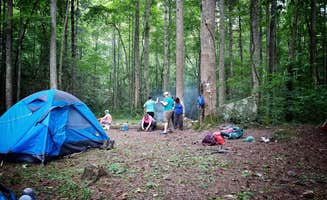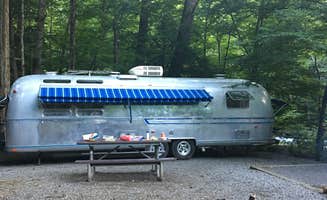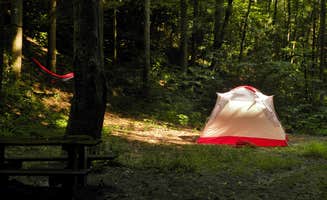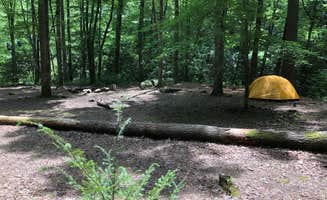Camping near Great Smoky Mountains National Park, North Carolina ranges from heavily-wooded sites at elevations of 2,000 feet to riverfront locations in lowland valleys. The North Carolina side of the park receives more annual rainfall than the Tennessee side, with Bryson City averaging 53 inches yearly. During summer months, evening temperatures typically drop 10-15 degrees cooler than daytime highs, creating ideal sleeping conditions even without air conditioning.
What to do
Tubing at Deep Creek: The Deep Creek area offers excellent water recreation just minutes from the campground. "Beautiful campground in the smoky mountains with lots of hiking to three waterfalls. The tent-only camping does not look like a lot of fun... But you are right by the creek for a dip anytime," reports Nick C. at Deep Creek Campground.
Fishing for trout: Creek access throughout many campgrounds provides fishing opportunities. "I parked at the smokemont car camping area, then packed into one of the backcountry sites for a weekend of blue line trout fishing on the Bradley Creek headwaters, feeding into the Oconaluftee River," explains Gary B. about Smokemont Campground.
Wildlife viewing: Early morning and late evening offer prime wildlife spotting times. "We had elk walk through one morning," shares Veronica S. at Smokemont. For dedicated wildlife watchers, consider the Cherokee area campgrounds with easy access to the Oconaluftee Visitor Center fields where elk regularly graze.
Historical structures exploration: Several hiking trails lead to preserved buildings from early settlers. "The campground has a wonderful area and the history of the place is amazing," notes Amy P. about hiking opportunities near camp.
What campers like
River sounds for sleeping: Many campsites back up directly to flowing water. "The sounds of rushing water from Little Pigeon River creates peaceful sleeping conditions," according to Larry M. at Greenbrier Campground, who added, "We stayed here over Christmas time in a 20' travel trailer. Very clean with heated bathrooms washing machines and other amenities. The sound of the rushing river is a plus."
Private bathroom facilities: Several campgrounds offer upgraded bathroom experiences. "The bath house appeared to be newer, and will trump your home facilities in many cases! Within the bath house, there are several private doors leading to your own 3 piece bath with shelving and granite counters with outlets, and a stunning double shower," writes Erin H. about Greenbrier.
Quieter camping areas: Some campgrounds see significantly less traffic than others. "The Cosby campground tends to be a little quieter than Cades Cove or Elkmont, but I like it that way! There is ample parking nearby and trailheads," explains Jessica L. from Cosby Campground.
Year-round access: "Local friends say that this campground is never full. When we were there in late August there were only 2-3 unoccupied spots," notes Lynn G. about Cosby Campground, making it suitable for last-minute trips.
What you should know
Reservation requirements vary: Some campgrounds fill months in advance while others remain accessible. "We stayed for one night, on a weeknight in early December. The campground was completely deserted (one other camper came in the evening, there were only two of us there!)," shares Carly E. about Smokemont's off-season availability.
No shower facilities in national park campgrounds: "The bathroom is clean, but no hot water or showers. If you wanted to shower you would have to drive to one of the nearby towns that offered showers at one of the rv campgrounds," explains Michelle A. about Cades Cove Group Campground.
Site spacing considerations: "Cramped and LOUD... However this campground is way too cramped and too loud. The sites are on top of each other," warns Veronica S. about Smokemont, emphasizing the importance of researching site layouts.
Weather impacts: "The road through the park shut down the night we were there due to snow and ice in the higher elevations, so keep weather in mind when visiting in the colder months," cautions Carly E. Winter campers should check road conditions regularly.
Tips for camping with families
Swimming holes access: Natural water features provide recreation for children. "My grands enjoyed playing in the shallow river in front of our campsite," shares Lori J. about Smokemont Campground, highlighting the safe water access.
Ranger programs: Educational activities run throughout peak season. "On Fridays they have special Ranger programs. We were lucky enough to learn about moon-shining from guys on the moonshiner TV show," explains Janine B. from Cosby Campground.
Privacy considerations: For families needing separation, investigate site layouts. "The tent sites are located next to the creek and equipped with tent pad, fire pit, and picnic table. Drive through and select your site before paying to get a nice spot," advises Marina V. about Deep Creek Campground.
Loop activities: "What a great campground!! This is away from the craziness of Gatlinburg and Pigeon Forge. It puts you back into the outdoors as the National Parks should be. The campground is beautiful and on certain days they close off the loop of Cades Cove for bicycles to be able to ride," explains Jeremy H.
Tips from RVers
Electrical availability: Limited electric sites exist within national park campgrounds. "Approx 20 miles from main visitor center. The scenic drive increases congestion and traffic. Camp store is near campsites. Also a ranger station. Several hiking trails are accessible from campground. All driveways shaded, paved, and level," notes Kim L. about Smokemont.
Leveling requirements: "Rocks line the driveway of each site, close enough to require careful placement to leave room for stairs and slides," warns Tod S. about Smokemont Campground, emphasizing the need for levelers.
Site selection tips: "The thing about Deep Creek Campground is that it's pretty unusual. Although sites say they are for tents or RVs, some are very odd and only have parking space for an RV on the road, and your table and other areas are above or below... Sites 79, 81 and 82, for example, are great for an RV, especially if it's not longer than 18 feet. And bring levelers; you will need them!" advises Susan G.


